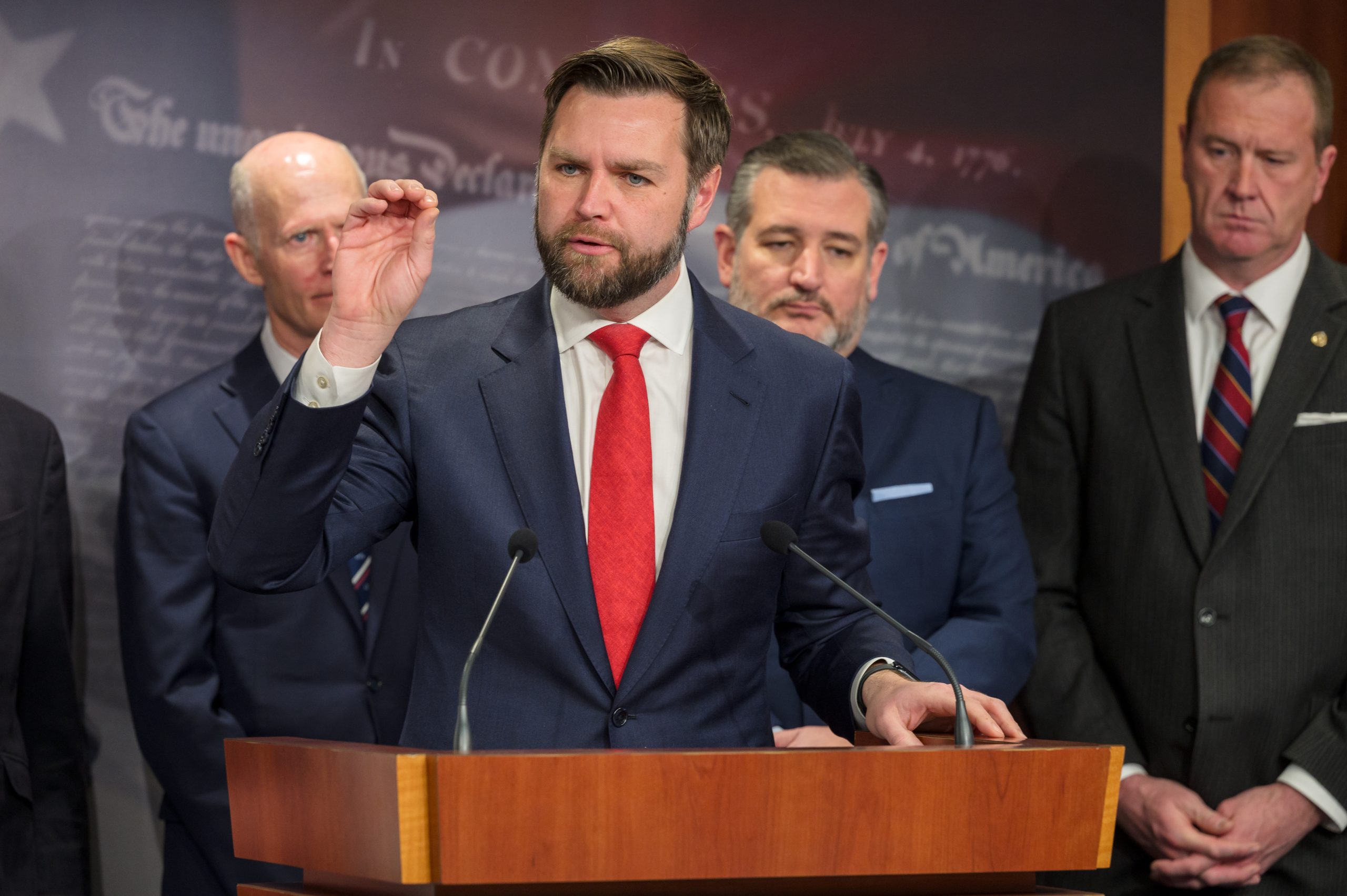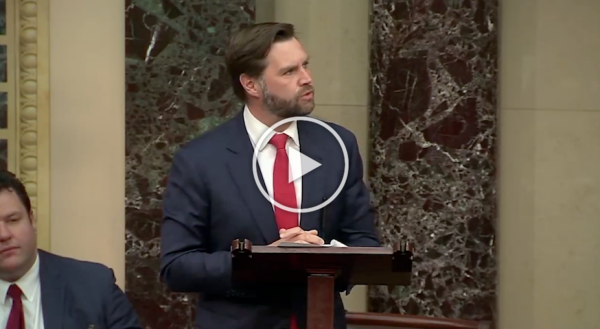“If the Europeans were forced to step up and provide for their own security, we could actually take care of some more domestic problems at home. But no. Too many in this chamber have decided that we should police the entire world. The American taxpayer be damned.”
WASHINGTON, D.C. – In remarks on the Senate floor today, Senator JD Vance (R-OH) slammed the U.S. foreign policy establishment for its failures in the Middle East, reflected on the lessons he learned as a U.S. Marine while deployed to Iraq, drew comparisons between the conflicts in Iraq and Ukraine, and reiterated many of his concerns with the United States’ posture towards the war in Ukraine.
Watch Senator Vance’s remarks here and read excerpts below.
Senator Vance on Congress repeating the failed foreign policies of 2003:
There is another historical analogy that I think is worth pointing out, and that is the historical analogy of the early 2000s. Now, in 2003, I was a high school senior, and I had a political position back then: I believed the propaganda of the George W. Bush administration that we needed to invade Iraq, that it was a war for freedom and democracy, that those who were appeasing Saddam Hussein were inviting a broader regional conflict.
Does that sound familiar to anything that we’re hearing today? It’s the same exact talking points 20 years later with different names. But have we learned anything over the last 20 years? No, I don’t think that we have. We have learned that if we beat our chests instead of engaging in diplomacy, that it will somehow produce good outcomes? That is not true.
We learned that if we talk incessantly about World War II, we can bully people and cause them to ignore their basic moral impulses and lead the country straight into catastrophic conflict.
Senator Vance on Congress’ focus on moralism over practical policies:
It’s one of the great ironies of my time in the United States Senate. For the last 18 months, I have been accused by multiple people of being a stooge of Vladimir Putin. Well, I take issue to that because in 2003, yes, I made the mistake of supporting the Iraq war. I also, a couple of months later, enlisted in the United States Marine Corps, one of two kids from my small block on McKinley Street in Middletown, Ohio, to enlist in the Marines just that year.
I served my country honorably, and I saw when I went to Iraq that I had been lied to, that the promises of the foreign policy establishment of this country were a complete joke. Just a few days ago, we saw our friends in the House waving Ukrainian flags on the floor of the United States House. I’d love to see them waving the American flags with such gusto, and I won’t complain about the fact that it was a violation of the rules of decorum, though it certainly was.
But it reminded me it reminded me, I believe 2005, maybe it was 2006, when that same exact chamber, the members were raising their fingers stained with purple ink to commemorate the incredible Iraqi elections that had happened in 2005.
I was in Iraq for both the constitutional referendum of October of 2005 and the parliamentary elections of December 2005, and I remember the people in Iraq happily voting, raising their fingers in the air. What I’m saying is not that the people of Iraq were bad, or that they were bad for voting in their elections, what I’m saying is the obsessive focus on moralism: “democracy is good, Saddam Hussein is bad, America good, tyranny bad.” That is no way to run a foreign policy because then you end up with people waving their fingers on the floor of the United States House of Representatives, even though they have walked their country into a disaster.
Senator Vance on Europe’s failure to stand on its own two feet:
For three years, the Europeans have told us that Vladimir Putin is an existential threat to Europe. And for three years, they have failed to respond as if that were actually true. Donald Trump famously told European nations they have to spend more on their own defense. He was chastised by members of this chamber for having the audacity to suggest that Germany should step up and pay for its own defense.
Even today, Germany, by some estimates, fails to hit its 2% of GDP threshold, where it’s supposed to spend 2% of its economy on military, and even if it hits that 2% threshold in 2024, it will have hit it, barely, after literally decades of being chastised. Now, is it fair that the Americans are forced to front this burden? I don’t think that it is, but I’m actually less worried about the fairness, and I’m more worried about the signal this sends to Europe. If we keep on carrying a substantial share of the military burden, if we keep on giving the Europeans everything that they want, they’re never going to become self-sufficient and they’re never going to produce sufficient weapons so that they can defend their own country.
You hear all the time from folks who support endless funding to Ukraine that unless we send resources to Ukraine, Vladimir Putin will march all the way to Berlin or Paris. Well, first of all, this doesn’t make any sense. Vladimir Putin can’t get to western Ukraine. How is he going to get all the way to Paris? And second of all, if Vladimir Putin is a threat to Germany and France, if he’s a threat to Berlin and Paris, then they should spend more money on military equipment.
Some of my fellow Americans have been lucky enough to travel to Europe. It’s a beautiful place. But one of the things that Europeans often say about Americans is that we have way too many guns and way too little health care. Well, one of the reasons why we have less health care access than the Europeans do is because we subsidize their military and their defense.
If the Europeans were forced to step up and provide for their own security, we could actually take care of some more domestic problems at home. But no. Too many in this chamber have decided that we should police the entire world. The American taxpayer be damned.
Senator Vance on the decimation of ancient Christian communities:
Here’s another thing that we should learn from the Iraq War, something that I, as a Christian, care a lot about. And I think that even many of my colleagues who are not Christians, many of my fellow Americans who are not Christians, should care about. The United States remains, to this day, the world’s largest majority Christian nation. We are the largest Christian nation by population in the entire world. And yet what are the fruits?
“By your fruits, you shall know them,” the Bible tells us. What are the fruits of American foreign policy when it comes to Christian populations all over the world over the last few decades? Well, in Iraq, before we invaded, there were 1.5 million Christians in Iraq, many of them ancient communities, Chaldeans, people who trace their lineage and their ancestors to people who knew the literal apostles of Jesus Christ. Now, nearly every single one of those historical Christian communities is gone. That is the fruit of American labor in Iraq: a regional ally of Iran and the eradication and decimation of one of the oldest Christian communities in the world. Is that what we were told was going to happen?
Did the American people, the world’s largest majority Christian nation in the world, did they think that’s what they were getting themselves into? I certainly didn’t, and I’m ashamed that I didn’t. But we did. We did all of those things because we weren’t thinking about how war and conflict lead to unexpected places.
Senator Vance on the bipartisan mistake of offshoring U.S. manufacturing while increasing global military commitments:
For 40 years, this country has made largely, I hate to say it, a bipartisan mistake. It has allowed our manufacturing might to get offshored and to get outsourced while simultaneously increasing the commitments that we have all over the world. We’ve basically outsourced our ability to manufacture critical weapons while stepping up our responsibilities to police the world, and of course, if we’re going to police the world, then it’s American troops who need those weapons.
So with one hand, we have weakened our own country and with the other we have overextended. There is a certain irony that if you look at the voting records and the commitments of this chamber, the people who have been most aggressive, my colleagues, some of them my friends, who have been most aggressive in sending our good manufacturing jobs to China, are now the ones who are most aggressive and assert that we can police the world.
Well, what are we supposed to police the world with? Our artillery manufacturing, our weapons, our air defense manufacturing, our basic military industrial complex has become incredibly weakened, and this bill, you’ll hear people say fixes it, it doesn’t fix it at all. In fact, this bill, while it does invest some, and this is a good thing by the way, it’s not all bad, while it does invest some in critical manufacturing of American weapons, it sends those weapons overseas faster than it even replenishes them. This is not a bill to rebuild the defense industrial base. This is a bill to further extend this country.
###


